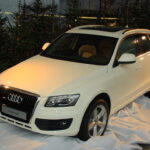10 Worst Diesel Engines that will Ruin Your Budget
For the most part, diesel engines have proven useful and sturdy in powering cars. However, not every car has been this fortunate as some engines have wound up being underwhelming or downright bad.
With this list, I’ll explain ten of the worst diesel engines you can come across and how they can lose you money rather than save it.
1. 1.6 TDI VW
The first one may come as a slight shock, but sadly Volkswagen’s 1.6 TDI makes this list. Normally, Volkswagen has made some fine engines, but this diesel is something of an exception. For starters, it’s very gutless. Its maximum bhp is a small 114, though its greatest offence is the 84bhp version found on the Golf Bluemotion.
Although meant to be extremely economical, tests have shown that it’s claimed 80.7mpg isn’t what you’d call easy to achieve. Many drivers have found they can mostly get up to just 42.8mpg. Considering how the Bluemotion is meant to be the most fuel-efficient Golf, this is something of a disappointment.
Then again, in the fallout of Volkswagen’s emissions scandal, disappointment isn’t the most surprising emotion to feel when looking at the Bluemotion.
2. Range Rover Evoque 2.0 ED4 SE
For the second spot, it shouldn’t be too surprising it’s a Range Rover, specifically the first generation Evoque. Land Rover’s SUVs aren’t exactly symbols of efficiency and while most of their range includes a wide variety of diesel engines, they’re not what you’d call conservative.
The 2.0-litre diesel eD4 Evoque made the bold claim of reaching 65mpg. Even in these times of extremely economical motoring, that’s very impressive for a big SUV that’s typically been the poster child for unnecessary gas guzzlers. Unfortunately, the Evoque doesn’t quite manage such numbers out in the real world.
Realistically, you’ll reach up to 40mpg, though don’t be surprised if it’s more. However, that’s one of the smaller concerns as Land Rover’s poor reputation with reliability means you’ll be more worried about a repair bill than how often you fill up. With the brand trailing in several reliability and satisfaction surveys, it would be wise to be extremely cautious when even considering one of these.
Read it: 10 Best BMW Diesel Engines (and Cars That Use Them)
3. xDrive 30d
The next diesel car might have an engine with a good track record, but its thirst cannot be ignored. The X5 and X6 SUVs from BMW used the same xDrive 30d engine (part of the N57 engine family) and though the straight-six diesel hasn’t been the worst when it comes to servicing and reliability, the mileage is a different matter.
Admittedly, even in today’s world SUVs aren’t expected to be the greenest cars in the garage, but even still it’s not good that reports say neither can creep past 30mpg. It’s a far cry from BMW claiming far more. Although they’re well made, the fuel bills ensure expensive ownership.
4. 3.0-litre V6 Diesel
Another Land Rover enters the list, this one being the Discovery SDV6. As the name suggests, it’s powered by a 3.0-litre V6 diesel whose origins go all the way back to 2004. Although the latest Discovery has a lighter, modern construction, truth is its old engine isn’t as fresh.
On the move, you’ll see it happily scoff down fuel and not even come close to cracking 30mpg. Even for a big, large engined SUV, it’s a poor showing, and the high price tag and poor satisfaction record I mentioned earlier make it something of a money pit.
Trending Video: How to Easily Bring Back to Life any Old Car Battery and Save Tons of Money (click to watch)
5. CDI BlueEfficiency
An older car on this list, the Mercedes SLK 250 CDI BlueEfficiency was meant as a very frugal choice. It was accompanied by the lofty claim of reaching 70mpg, which is remarkable for a hardtop convertible. Sadly, it turns out the SLK somewhat misses the mark.
In reality, you’ll far more likely hit past 40mpg, maybe a little bit more, which is a sharp decline from what it’s said to achieve. If you’re in the used market, looking for an economical convertible, you might want to think twice before going for this one.
Read it: 10 Car Brands that Last Almost Forever (Unbreakable)
6. 2.0 CRDI
The previous Hyundai Tucson was an unassuming car. It may be a crossover, but it certainly appeared to be one of the greener ones. In the case of its 2.0-litre diesel variant, however, there’s a bad surprise in store. If equipped with four-wheel drive, then you’ll find it doesn’t quite reach the 40 odd mpg it’s supposed to.
Instead, it goes up to around 27mpg, which is poor and though a two-wheel-drive version would improve the numbers, the truth is it remains unimpressive. In fact, most of the Tucson’s engines aren’t great at making it to their claimed mileage.
7. 1.5 TDCi
It’s odd having to put a Ford on this list, seeing how their EcoBoost engines have been such brilliant pieces of engineering. Sadly, the Ford Focus can be a letdown with its diesels. Its 1.5 TDCi is the biggest offender here though.
If it’s the 120bhp variant, you’ll find its claim of up to 80mpg is more like 54mpg. Although that’s not the worst one here. The 94bhp version is far worse for mileage. It’s said to reach a very good 80mpg, but instead, its real-life mileage is dramatically different. You could end up seeing it get up to just 48mpg, nearly half of its claimed total.
While this is one of the cheaper Focus’ to buy, the fact its economy is so drastically lower undermines its role as a frugal runabout.
8. 3.0-litre turbocharged V6
Cars like the Mercedes GL Class (or GLS to use its updated name) were never destined to sip fuel. Not when the car in question is a giant SUV, but in this day and age, it remains a very poor performer.
If we look at the original GL, its most efficient engine, the 3.0-litre turbocharged V6, you’ll find it’s claimed to go up to 30mpg. In reality, this is a fairly tall order and you’re often going to be reaching around the mid-20s. To add insult to injury, owning a GL is not cheap regardless of the economy.
The reliability record isn’t too bad but be warned. These big Mercedes can wind up giving you a big bill if something goes wrong. Unfortunately, the second-generation GL doesn’t fare much better either.
It used the same V6 diesel but promised better fuel use. Instead, it does about similar numbers as the old car. Needless to say, it’s even more disappointing when this is supposed to be the new and improved one.
Are Diesels over 200k miles worth it? Find it out here.
9. 2.0-litre turbo four-cylinder
Even the most acclaimed cars can leave you unimpressed with their mileage. The previous BMW 5-Series was a big hit with critics and consumers alike, but not everything about it is perfect. A couple of its diesel engines aren’t the most truthful in terms of fuel efficiency.
The 2.0-litre turbo four-cylinder 520d and 3.0-litre turbo straight-six 535d versions don’t quite match the claimed numbers. Both were said to make it to around or even over a very respectable 60mpg. What people often found was more toward the mid-30s or lower.
This doesn’t help the fact that a BMW like the 5-Series isn’t the cheapest to purchase and what’s worse is that the brand hasn’t scored too greatly in reliability surveys at times. 5 Series cars have a habit of developing electrical and engine issues at times.
Read it: 10 Best Mercedes Cars Under $10k (Good Condition)
10. 1.6 four-cylinder diesel
Citroen is a brand that has made many economical cars, but the C4 Spacetourer can be an exception. Although it looks space-age, its 1.6 four-cylinder diesel doesn’t quite manage the supposed 70mpg. Truth is, you’re more like to see it’s over 40mpg.
Citroen also doesn’t rank too high on satisfaction surveys either, so that’s another blow to those hoping to bank on Citroen and their reputation in affordable motoring.
What are the Best Diesel Engines?
There are still plenty of excellent diesel cars out there, despite some not reaching their goals. The 1.5 four-cylinder diesel found in several Peugeot and Citroen cars remains a very frugal choice. In the current Peugeot 208 and Citroen C3, you can reach over 60mpg, which isn’t that sharp a drop from their claimed 73mpg.
Another one to consider is the Mercedes E300de. It’s a diesel hybrid, so not only do you get the efficiency of its 2.0-litre diesel but the assistance of battery technology that boosts mileage even further. Realistically, you can make up to 80mpg and the range it has before needing a refill is startling.
A final choice to consider is the Dacia Sandero and its 1.5-litre four-cylinder. The engine belongs to the reputable K-Type engine dynasty created by Renault. More often than not, you probably won’t reach the near 80mpg total, but it does come close, going well past 60mpg.
The Sandero is also extremely cheap to buy and maintain. If there was ever a diesel that won’t ruin your budget, it’s this one.
Conclusion
I hope you found this guide helpful. Diesel engines can be deceiving at times. Although known for being economical and durable, even some modern ones can perform below expectations. Putting into account their true mpg and their chances of mechanical issues can help discover which diesel to avoid and which ones will stick to your budget.






